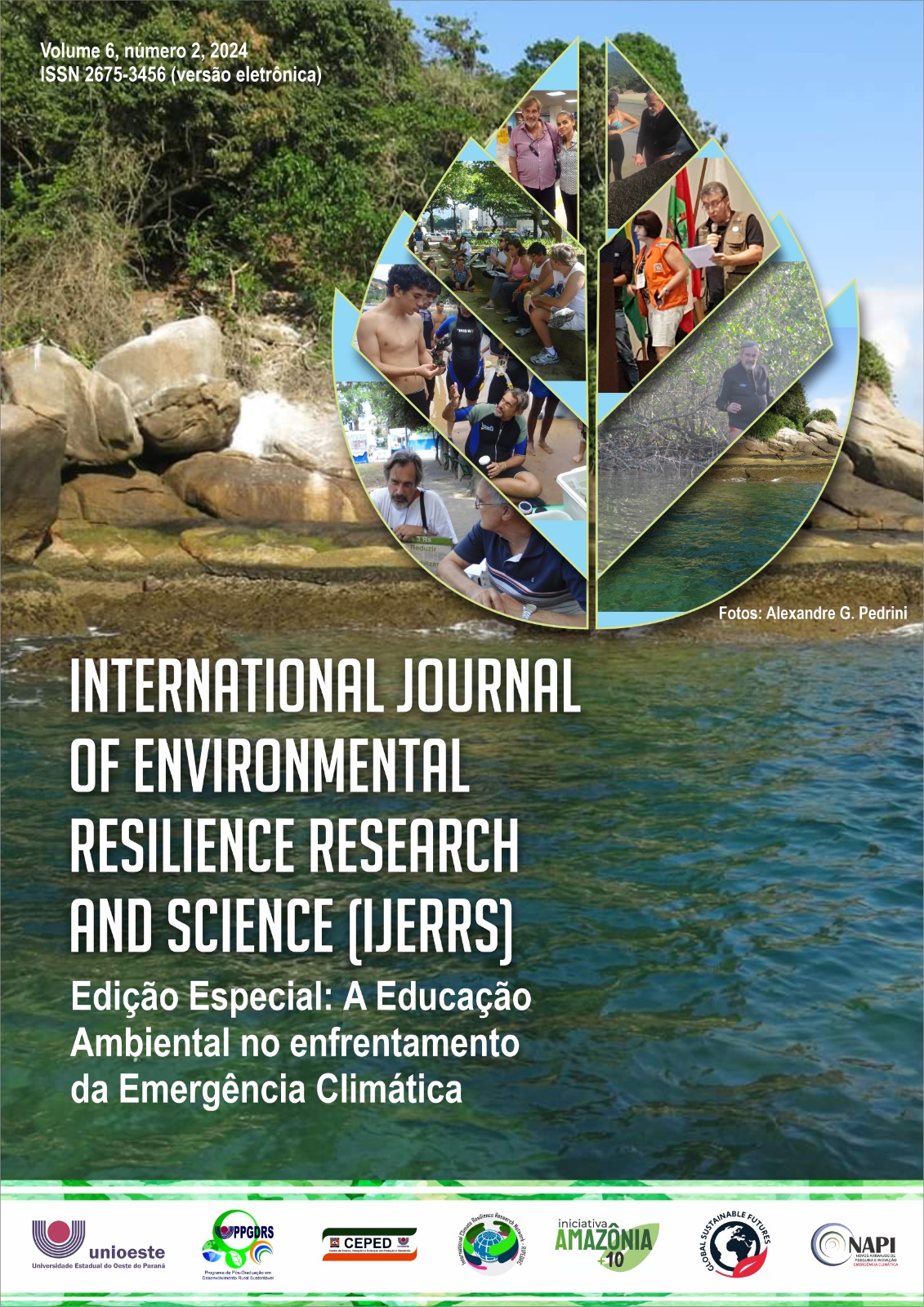Educação Ambiental frente a Emergência Climática: uma proposta de guia didático para aplicar numa trilha interpretativa
DOI :
https://doi.org/10.48075/ijerrs.v6i2.33519Résumé
Resumo: O estado de Emergência Climática afeta negativamente todo o planeta especialmente os países ambientalmente enfraquecidos pelos povos ricos que a causam e lhes oprimem econômica e socialmente. Essa injustiça climática tem que ser enfrentada e resolvida e a educação ambiental crítica possui um farto arsenal teórico-prático para solução dessa problemática. A ampla e urgente capacitação de professores em educação ambiental crítica está prevista nas políticas públicas nacionais para enfrentar problemáticas socioambientais como as mudanças globais climáticas de origem antropogênicas que levam ao estado de Emergência Climática. O presente trabalho contribui para esse contexto, apresentando um guia didático apoiado por material didático para aplicação na trilha da Baleia no Parque Natural Municipal da Taquara no município de Duque de Caxias, estado do Rio de Janeiro. O guia didático está associado ao conteúdo de Biologia que foi formulado a partir de um modelo teórico publicado anteriormente de educação ambiental crítica para ser ministrado em nove pontos interpretativos numa trilha interpretativa com auxílio do aplicativo STRAVA. Esse guia didático foi formulado para aplicar associado a preleção, compondo assim a aula extraclasse de educação ambiental crítica a ser aplicada na trilha interpretativa. A aula contemplou em seu conteúdo programático: a) a interação sensorial dos partícipes com o contexto local; b) a biodiversidade identificada taxonomicamente e com nome vulgar do bioma a Mata Atlântica; c) a diversidade humana com a sua cultura; d) causas e consequências da Emergência Climática e os problemas locais associados a ela. A sua avaliação quantitativa conteudista é feita por meio de questionários pré/pos-teste. A cada aula extraclasse de educação ambiental crítica no enfrentamento à Emergência Climática que é ministrada segue associada às suas respectivas competências e habilidades da Base Nacional Comum Curricular. Concluindo, as bases do guia didático de aulas extraclasses de educação ambiental crítica para trilhas interpretativas com nove pontos interpretativos para abordar as mudanças climáticas globais de origem antropogênicas que provocam o estado de Emergência Climática está disponível para ser utilizado na trilha da Baleia do Parque Natural Municipal da Taquara em Duque de Caxias no estado do Rio de Janeiro, Brasil.
Palavras-chave: Aula prática de campo. Mudança climática. Educação básica. Educação formal. Roteiro didático.
Téléchargements
Publié-e
Comment citer
Numéro
Rubrique
Licence
(c) Tous droits réservés International Journal of Environmental Resilience Research and Science 2024

Cette œuvre est sous licence Creative Commons Attribution - Pas d'Utilisation Commerciale - Partage dans les Mêmes Conditions 4.0 International.
Aviso de Direito Autoral Creative Commons
Política para Periódicos de Acesso Livre
Autores que publicam nesta revista concordam com os seguintes termos:
1. Autores mantém os direitos autorais e concedem à revista o direito de primeira publicação, com o trabalho simultaneamente licenciado sob a Licença Creative Commons Attribution que permite o compartilhamento do trabalho com reconhecimento da autoria e publicação inicial nesta revista.2. Autores têm autorização para assumir contratos adicionais separadamente, para distribuição não-exclusiva da versão do trabalho publicada nesta revista (ex.: publicar em repositório institucional ou como capítulo de livro), com reconhecimento de autoria e publicação inicial nesta revista.
3. Autores têm permissão e são estimulados a publicar e distribuir seu trabalho online (ex.: em repositórios institucionais ou na sua página pessoal) a qualquer ponto antes ou durante o processo editorial, já que isso pode gerar alterações produtivas, bem como aumentar o impacto e a citação do trabalho publicado (Veja O Efeito do Acesso Livre).
Licença Creative Commons
Esta obra está licenciada com uma Licença Creative Commons Atribuição-NãoComercial-CompartilhaIgual 4.0 Internacional, o que permite compartilhar, copiar, distribuir, exibir, reproduzir, a totalidade ou partes desde que não tenha objetivo comercial e sejam citados os autores e a fonte.









